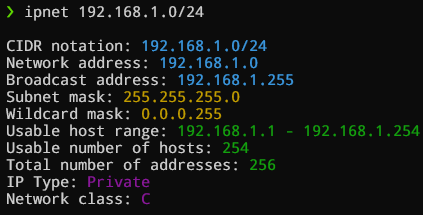A CLI tool for IP subnet calculation and network information. It is minimal and compact, your network info Swiss Army knife.
- Features
- Usage
- Examples
- Demo
- Requirements
- Installation
- Why IPnet? A Comparison with ipcalc and other tools
- Changelog
- Contributing
- License
- Calculate network information from an IP address in CIDR notation, or an IP address with a subnet or wildcard mask.
- Displays the following information, example below:
- Available in Windows, Linux and MacOS binaries
ipnet <IP> [Mask]ipnet 192.168.1.0/24
ipnet 192.168.1.0 255.255.255.0
ipnet 192.168.1.0 0.0.15.255- Python 3.9 or higher
To install IPnet CLI tool from GitHub, follow these steps:
git clone https://github.com/nicanorflavier/ipnet.git
cd ipnet
pip install .To install it via PyPi:
pip install ipnetStart using it from your cli
ipnet <IP> [MASK]Or you can download the release binaries for Windows, MacOS and Ubuntu on release page and run it directly.
You might be thinking, "Why should I use IPnet when I already have ipcalc or other IP calculation tools?"
First off, ipcalc and similar tools are fantastic and provide a wealth of information. However, IPnet is minimal and compact like a swiss army knife to get the IP network information you need quickly.
-
Simple - IPnet is designed to be a lightweight and compact. While other tools may offer a wide range of features and options, IPnet prioritizes quick network information lookup.
-
Cross-Platform Availability - One of the key advantages of IPnet is its cross-platform availability. Unlike some tools that are limited to specific operating systems or distributions, IPnet provides pre-built binaries for Windows, MacOS and Ubuntu, ensuring that users can easily run the tool regardless of their preferred platform. MacOS binary is coming soon.
-
Ready-to-Use Binaries - IPnet offers pre-built binaries for Windows, MacOS and Ubuntu, allowing users to quickly download and run the tool without the need for compilation or installation. This makes IPnet a convenient choice for users who prefer a hassle-free setup or those who need a quick IP calculation tool without the overhead of installing dependencies.
While IPnet may not offer the extensive feature set of some other tools, its simplicity, cross-platform availability, and ready-to-use binaries make it a valuable addition to any developer's toolkit, especially for those working in Python-centric environments or those who value a streamlined and focused approach to IP subnet calculation and network information display.
See the CHANGELOG.md file for details about what has changed in each release of IPnet.
IPnet is an open-source project, and we believe that the more people contribute, the better it becomes.
-
Report Bugs: Please open an issue provide detailed information about the problem, including steps to reproduce it, and any relevant error messages or logs.
-
Suggest Features: Have an idea for a new feature or improvement? We'd love to hear it! Open an issue and describe your proposed feature in detail.
-
Submit Pull Requests: If you'd like to contribute code changes or bug fixes, feel free to fork the repository, make your changes, and submit a pull request. Please ensure that your code follows our coding conventions and includes tests.
-
Spread the Word: If you find IPnet useful, please help spread the link here: https://github.com/nicanorflavier/ipnet
This project is distributed under the GNU General Public License (GPL) v3.0 License. See LICENSE.txt for more information.
If you have any questions or suggestions, feel free to reach out. You can find my contact details on my GitHub profile https://github.com/nicanorflavier








